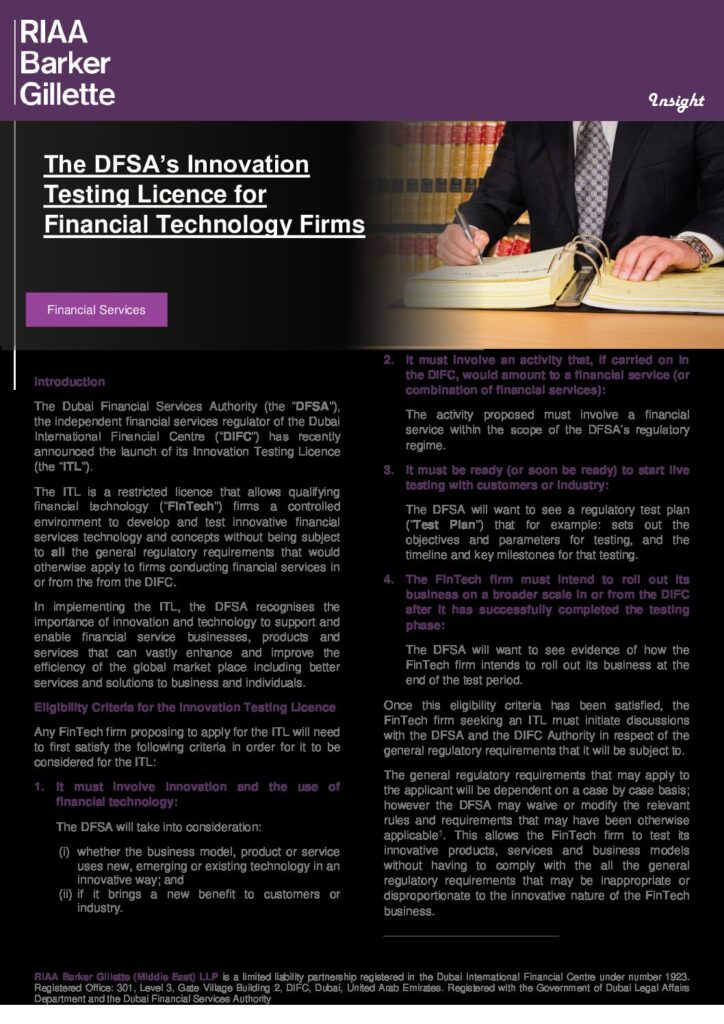
Introduction
The Dubai Financial Services Authority (the “DFSA”), the independent financial services regulator of the Dubai International Financial Centre (“DIFC”) has recently announced the launch of its Innovation Testing Licence (the “ITL”).
The ITL is a restricted licence that allows qualifying financial technology (“FinTech”) firms a controlled environment to develop and test innovative financial services technology and concepts without being subject to all the general regulatory requirements that would otherwise apply to firms conducting financial services in or from the from the DIFC.
In implementing the ITL, the DFSA recognises the importance of innovation and technology to support and enable financial service businesses, products and services that can vastly enhance and improve the efficiency of the global market place including better services and solutions to business and individuals.
Eligibility Criteria for the Innovation Testing Licence
Any FinTech firm proposing to apply for the ITL will need to first satisfy the following criteria in order for it to be considered for the ITL:
1. It must involve innovation and the use of financial technology:
The DFSA will take into consideration:
– whether the business model, product or service uses new, emerging or existing technology in an innovative way; and
– if it brings a new benefit to customers or industry.
2. It must involve an activity that, if carried on in the DIFC, would amount to a financial service (or combination of financial services):
The activity proposed must involve a financial service within the scope of the DFSA’s regulatory regime.
3. It must be ready (or soon be ready) to start live testing with customers or industry:
The DFSA will want to see a regulatory test plan (“Test Plan”) that for example: sets out the objectives and parameters for testing, and the timeline and key milestones for that testing.
4. The FinTech firm must intend to roll out its business on a broader scale in or from the DIFC after it has successfully completed the testing phase:
The DFSA will want to see evidence of how the FinTech firm intends to roll out its business at the end of the test period.
Once this eligibility criteria has been satisfied, the FinTech firm seeking an ITL must initiate discussions with the DFSA and the DIFC Authority in respect of the general regulatory requirements that it will be subject to.
The general regulatory requirements that may apply to the applicant will be dependent on a case by case basis; however the DFSA may waive or modify the relevant rules and requirements that may have been otherwise applicable[1]. This allows the FinTech firm to test its innovative products, services and business models without having to comply with the all the general regulatory requirements that may be inappropriate or disproportionate to the innovative nature of the FinTech business.
In addition, the FinTech firm seeking an ITL must satisfy certain general requirements these include: compliance with the UAE Federal Laws and DIFC Laws, acting with integrity, care, diligence and due skill as well as the FinTech business being located in the DIFC.
Application Process
The FinTech firm submitting an application for the ITL will need to complete:
1. an ITL application form; and
2. file a Test Plan which should set out amongst other things, the:
– business and the proposed innovative FinTech product or service;
– objectives and parameters for the testing of service or products;
– timeline and key milestones for testing;
– number and type of customers that will take part in the testing and how they will be sourced;
– key risks of testing and how they will be mitigated; and
– how the progress in respect of the testing will be reported to the DFSA.
Upon submission of the ITL application form and Test Plan, the DFSA will review the complete application and will need to be satisfied that the information included in the application and Test Plan is appropriate and complete.
The applicable fees for a FinTech firm seeking an ITL will depend on the nature of its activities. However, given the ‘start-up’ nature of the FinTech firm, the DFSA may consider reducing or waiving the relevant fees for the duration of the testing period. Once the FinTech business has completed testing, it will be expected to pay the standard fees as prescribed by the DFSA.
Issue of and Validity of ITL
If the DFSA is satisfied with the applicant’s application for an ITL, it will issue an ITL which may contain certain restrictions and conditions on the FinTech firm: this could include for example:
– a restriction on the business that may be carried on under the ITL to testing the specific FinTech product or service;
– a restriction the number of and type of customers that may participate in the testing;
– period during which it may carry out the relevant testing;
– a condition that the FinTech business complies with its regulatory test plan; and/or
– a condition to disclose in any communications that it is only authorised by the DFSA to test its product or service.
Once the ITL has been issued, the FinTech firm will be able to test the product or service for a period of 6 to 12 months. An extension may be sought from the DFSA beyond the testing period, however this will only be granted by the DFSA in exceptional circumstances.
If the business meets the requirements detailed in the Test Plan and it can meet DFSA’s full authorisation requirements it may be granted full authorisation.
The information mentioned in this article is current at the date of publication of this article and available from public sources. Nothing in this article constitutes legal advice and should not be construed as any form of advice.
For further information and assistance with any aspect of the DIFC and DFSA regulatory framework and licensing process, please do not hesitate to contact us.
[1] DFSA Rule Book – General Module Chapter 13.
